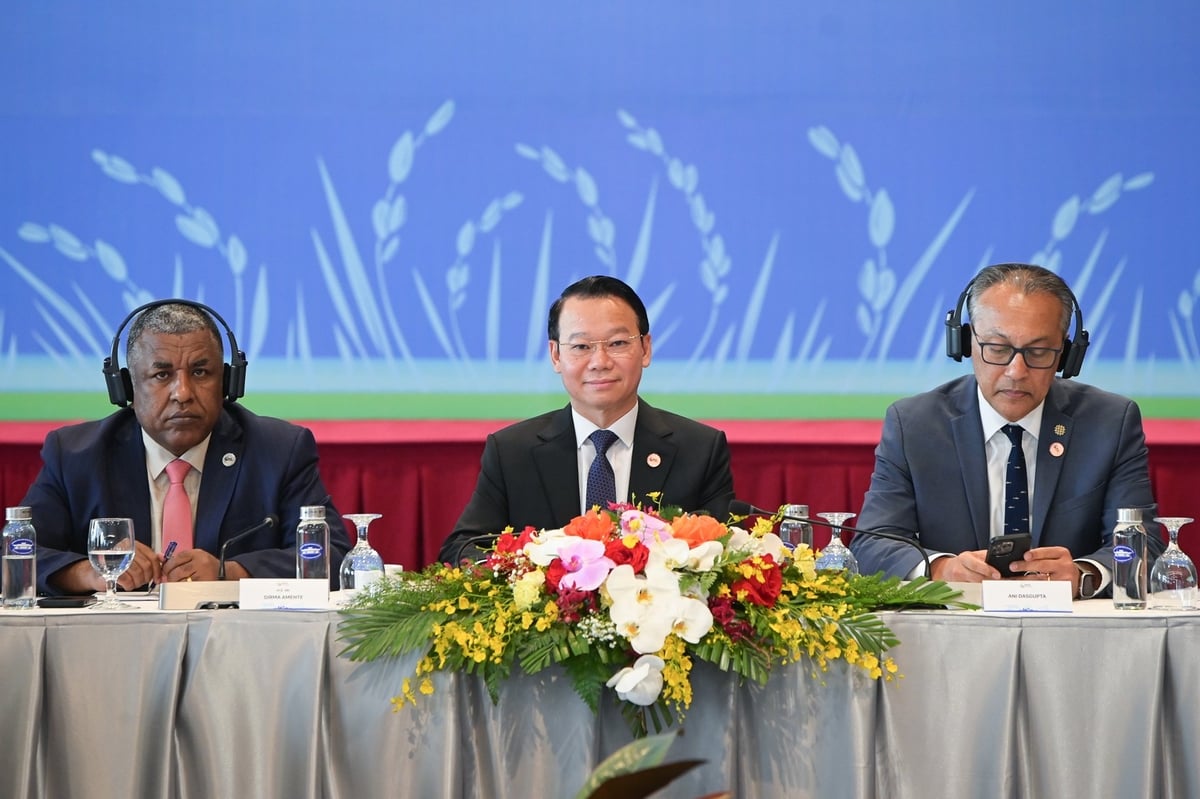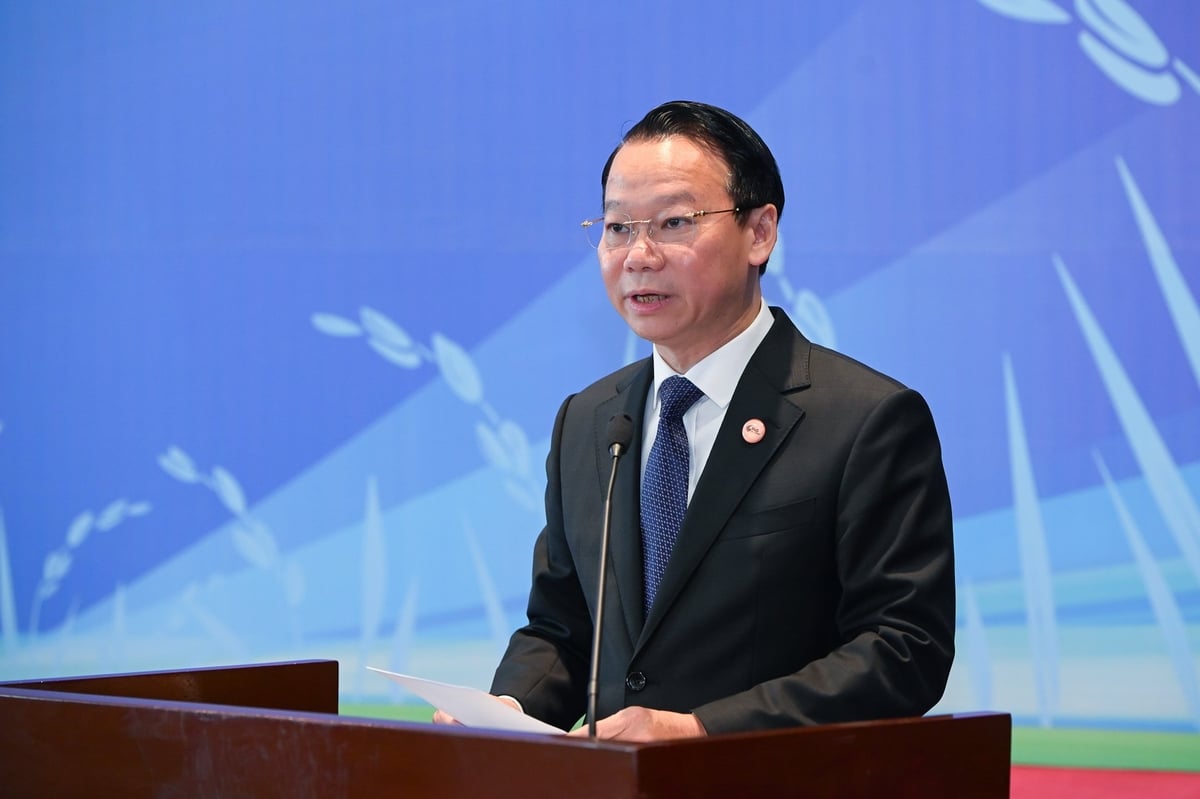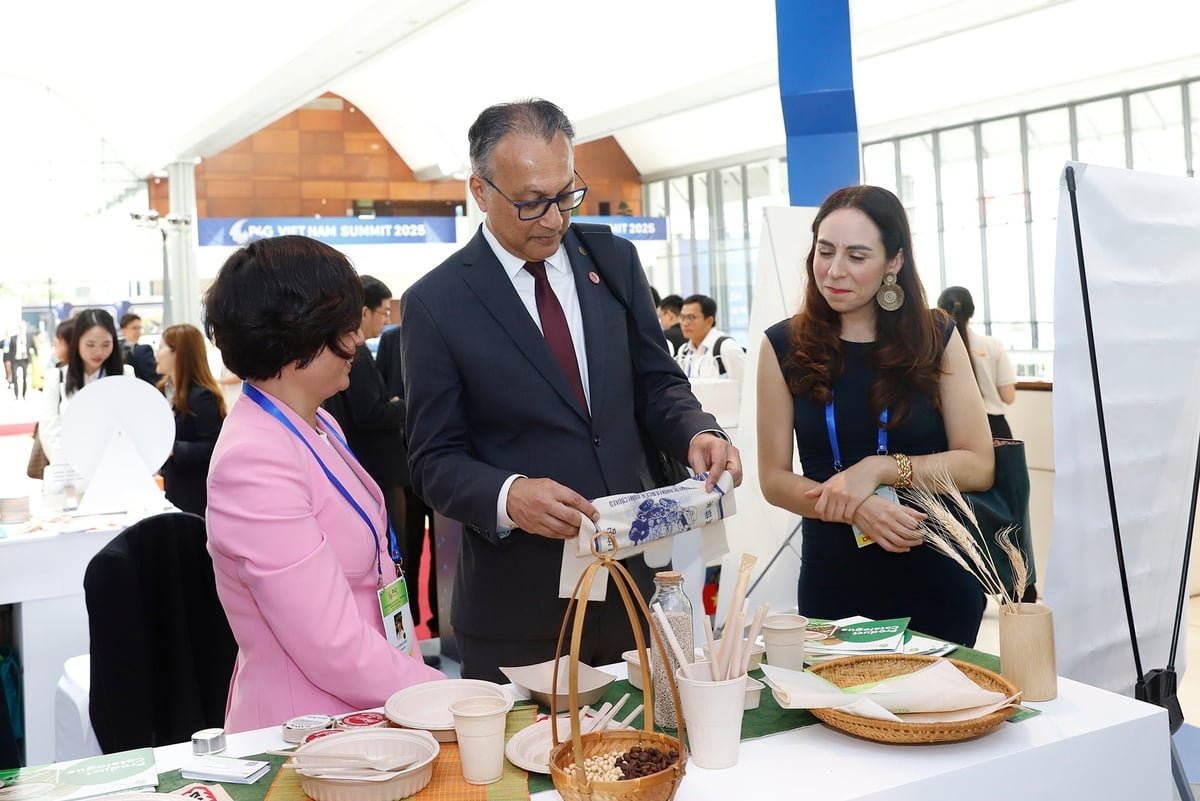May 20, 2025 | 04:03 GMT +7
May 20, 2025 | 04:03 GMT +7
Hotline: 0913.378.918
May 20, 2025 | 04:03 GMT +7
Hotline: 0913.378.918
On April 17, Vietnam's Minister of Agriculture and Environment Do Duc Duy chaired a ministerial session titled "Riding with the Green Revolution 4.0: The Journey of Transforming the Food System for a Sustainable Era" within the framework of the P4G Summit.

Minister Do Duc Duy chaired a ministerial sesion within the framework of the P4G Summit. Photo: Tung Dinh.
In his welcoming speech, Minister Duy stated that we are facing unprecedented challenges: increasingly severe climate change, rapid decline in biodiversity, disruption of global food supply chains due to geopolitical upheaval and the rise of protectionism, food security threatened, and the development gap between countries is increasing. In this context, the most vulnerable groups – poor farmers, low-income consumers, and fragile nature – are suffering the worst.
We can't solve the climate crisis by creating a food crisis. We cannot protect the environment if we neglect small-scale farmers. And we cannot demand that low-income countries preserve sustainable environmental resources, if the world does not share the responsibilities and benefits fairly.
In that context, the Green Revolution 4.0 is not just an option but an inevitable requirement, an order to act. This revolution expects to comprehensively innovate the food system through the application of digital technology, artificial intelligence, big data, biotechnology, and innovative solutions.
Therefore, the theme "Riding with the Green Revolution 4.0: The Journey of Transforming the Food System for a Sustainable Era" emphasizes the vital role of innovation, the application of digital technology, green technology, multi-stakeholder cooperation, and public-private partnership in creating a sustainable food future and justice for humanity.
In Vietnam, agriculture plays a particularly important role in ensuring food security, social stability and livelihoods for over 60% of the population; contributing 12% of national GDP (2024 data).
From a low-starting country that has faced poverty and food crises, Vietnam has risen to the top of the world's agricultural exporting countries, present in nearly 200 countries and territories.
However, with limited resources, we estimate that only about 10.3 million hectares of land can be used for agriculture, and Vietnam's agriculture faces many major challenges.

Minister Do Duc Duy calls on the international community to join hands to ensure food security. Photo: Tung Dinh.
Minister Do Duc Duy emphasized: "We understand that prosperous agriculture cannot exist if natural resources continue to be threatened, the land continues to deteriorate, and the climate continues to warm".
To solve those challenges, the MAE is implementing agricultural transformation towards green, smart, and sustainable, in which the Ministry identifies innovation, focusing substantively on research, application of modern science and technology, and digital transformation as the core to create breakthroughs for the agricultural industry.
The Government of Vietnam has promulgated and implemented the Sustainable agriculture and rural development strategy for the 2021-2030 period, with a vision to 2050; National Action Plan to transform a transparent, responsible and sustainable food system in Viet Nam by 2030; Scheme on scientific development and application and technology transfer to promote the circular economy in agriculture by 2030. Additionally, the Minister mentioned the One Million Hectares of High-Quality and Low-Emission Rice in the Mekong Delta as a national vision for green growth and food security.
All of them have shown our determination in developing a modern, sustainable agriculture that is responsible for nature and people as well as in line with the general development trend of the world.
However, the Ministry is acutely aware that no country can succeed alone in the journey of transforming food systems. This is an effort that requires joint action between countries, international organizations, businesses, scientists, and farmers. In the context of the global trade order, it is in danger of fragmentation as tariff barriers and protectionism emerge.
Vietnam believes that only substantive multilateral cooperation, on the basis of fairness and mutual respect, can help us overcome the enormous challenges of food security, biodiversity, and climate change, for equitable and sustainable development for each country and on a global scale.

The P4G Summit opens up a space for dialogue, resource mobilization and knowledge sharing. Photo: Khuong Trung.
The P4G Summit, as a hub for connectivity, is the ideal space to build joint cooperation initiatives, mobilize resources and share knowledge. In that spirit, the ministrial session offers an opportunity for leaders, partners, organizations, and the business community to share the following practical topics:
Firstly, policies should promote the application of technology and innovation in agricultural production to use resources efficiently, improve productivity and quality, and especially reduce emissions.
This is an inevitable direction for the agricultural sector to take to adapt to climate change and contribute to the "zero" net emission goal that many countries are aiming for.
Second, the role of regulatory agencies, international organizations, and the private sector in technology transfer, financial and technical support, and capacity building for farmers, especially small-scale farmers. Close and comprehensive coordination between the parties is a prerequisite to ensuring the effectiveness and sustainability of transformation programs.
Third, it is the sharing of experiences, models and good practices from countries in the development of green and circular agriculture, while ensuring food security and livelihoods for people. Valuable experiences will contribute to enriching our common thinking and actions.
I believe that today's discussion session will make important steps, contributing to shaping a sustainable global food system, meeting the requirements of the Green Revolution 4.0 and ensuring food security, protecting our planet forever green for future generations.
Finally, I would like to reiterate the ending of the famous song about Vietnam's rice plants: "Tomorrow is starting today". Let's sow the seeds of technology together from this moment, cultivate cooperation to bear fruit for the green future of all mankind.

(VAN) This was the assessment shared by experts at the workshop titled 'Assessing the Role and Potential of Low-Emission Rice Production Systems in Vietnam,' held on the morning of May 19.

(VAN) Cai Rong Port is the fisheries control center of Quang Ninh, helping to monitor fishing vessels, combat IUU fishing, and remove the EC's 'yellow card'.

(VAN) The German Agricultural Society (DLG) explores the possibility of establishing a mechanization service center in Vietnam’s Mekong Delta to support farmers in accessing and utilizing advanced machinery.

(VAN) On May 16, the Department of Water Resources Management, in collaboration with the Food and Agriculture Organization of the United Nations (FAO), held a signing ceremony for the GEF-8 project document.

(VAN) Food safety, mechanization, vocational training, and market opening are key areas of cooperation expected between the Vietnamese Government and the Federal Republic of Germany.

(VAN) Deputy Minister Nguyen Quoc Tri also expressed his hope that Cuba will soon overcome its current challenges, attain food security, and further expand cooperation with Vietnam.

(VAN) The project contributes to enhancing the resilience of communities vulnerable to the impacts of climate change, with a primary focus on local women.